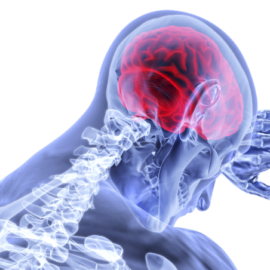
Inflammation is both a cause and an effect of many health problems. In fact, if you’re trying to improve your lifestyle, there are several sources of inflammation you’re probably missing.
First and foremost, though, what is inflammation and why do we get it?
What Is Inflammation?
Inflammation is an immune response that occurs when there is damage to our cells, an infection, or too much physical or chemical stress.
It also protects our joints, like those of our shoulders, knees, and spine, when we’re straining them too hard.
Inflammation is not a mistake. It’s an important response that helps protect, defend, and heal the body.
Unfortunately, it can linger for weeks, months, or even years under certain circumstances and negatively effect our health.
Some signs of chronic inflammation are…
- Fatigue
- Insomnia
- Headaches
- Brain Fog
- Acid Reflux
- Heartburn
- Acne and Eczema
- Joint Pain
- Joint Stiffness
- Chronic Muscle Pain
- Frequent Infections
- Digestive Issues
- Stomach Bloating
- Constipation and Diarrhea
- Depression, Anxiety, and other Mood Disorders
What’s more, chronic inflammation increases our risks for recurring pain and repetitive injuries.
It can also contribute to diseases like rheumatoid arthritis, asthma, diabetes, heart disease, as well as some forms of cancer.
This is ultimately why it’s important to identify all sources of inflammation you’re missing and eliminate them.
How Exactly Is Inflammation Helpful?
Although inflammation can be painful and cause health problems, it can also be helpful.
The process of inflammation works like this…
When the body is damaged, or when a virus or bacteria is present, immune cells release chemicals (cytokines) which put white blood cell to work.
These white blood cells are meant to kill and clean up dead and foreign material while other proteins fight infection.
All of this is done to eliminate the threat, prevent further damage, and promote tissue repair.
While short-term inflammation is beneficial, with enough time it can raise the risks of heart disease, cancer, diabetes, and Alzheimer’s disease (1).
Inflammation has also been blamed in disorders that damage the central nervous system like Amyotrophic Lateral Sclerosis or ALS (2).
These negative effects occur because chronic inflammation is basically a “seek and destroy” mission that never gets cancelled. As a result, body tissues and DNA can be permanently damaged.
Sources of Inflammation You’re Probably Missing
Everyone has experienced the kind of inflammation that results from a twisted ankle or an insect bite, but those effects end once the body has healed itself.
There are other habits and life events, however, that can keep the inflammatory response active, such as…
1. Emotional Stress
Money problems, relationship stress, social anxiety, school deadlines, work demands, fear, worry, and a hundred other emotional stressors, all contribute to the mental pressure we experience every day.
Emotional stress causes the release of stress hormones like adrenaline and cortisol into the bloodstream.
Consistent elevation of these stress hormones makes it more difficult for the body to control inflammation (3).
2. Lack of Sleep
Approximately one third of US adults are deprived of sleep (4).
Those statistics are probably higher among teens.
Chronic sleep loss has been shown to increase inflammation even in otherwise healthy individuals (5).
3. Smoking
In a report published in 2016 in the Journal of Leukocyte Biology, scientists explained that the chemicals in cigarettes elevate white blood cells that cause inflammation (6).
4. Dietary Factors
The standard American diet lacks nutrition and contributes to disease.
The following substances and foods will cause inflammation that will persist as long as we continue to eat them.
- Sugar
- Dairy
- Refined Carbohydrates
- Processed Meat
- Artificial Trans Fats
- Vegetable and Seed Oils
- High Fructose Corn Syrup
5. Prescription Drugs
Finding published research linking prescription medications to inflammation and its associated health problems isn’t easy.
Why would the pharmaceutical industry want to study such a thing anyway?
Nonetheless, one has only to watch a few drug commercials to learn of the dangerous list of side effects that can result from many of today’s medical treatments.
Could inflammation be one way the body protects itself against these foreign chemicals?
While I am not suggesting that anyone stop taking their prescribed medications, it might be helpful to ask your physician about your medical treatments and how they could be contributing to your health problems.
6. Alcohol
There are two ways in which alcohol causes inflammation.
The first is in the way that alcohol damages our cells. The second is in intestinal (gut) damage and the destruction to intestinal microflora (good bacteria). (7)
Studies show an increase in inflammatory markers in people who drink alcohol. The more we drink, the more severe the inflammation (8).
Two other studies revealed that people who drink heavily (more than two standard drinks per day) risk developing leaky-gut syndrome that can lead to organ damage (9)(10).
7. Being Overweight
Not only does weight gain and obesity place extra strain on ligaments, discs, and joints of the spine, but it is also associated with an increase in inflammatory cytokines.
Studies have shown that losing weight decreases inflammation (11).
8. Sedentary Lifestyle
The average adult in the U.S. spends 9-12 hours per day sitting.
Inactivity causes nearly every body system to decline.
Aside from that, sitting for long periods is terribly stressful on the spine and other joints of the body, especially the hips and lower back. The result of that stress on our joints is inflammation.
Read More: 7 activities to avoid when your lower back hurts.
Research shows a strong connection between prolonged sitting and inflammation. In fact, the longer we sit, the more inflammation develops (12).
Scientists in another study noticed that as sedentary time increased in their subjects, the risk of early death by any cause also increased (13).
Movement is life. The body thrives when physical activity is a regular part of an individual’s lifestyle.
Read More: Why your back keeps going out and 5 things you can do about it.
A Final Word About Chronic Inflammation
As you can see, battling inflammation requires more than simply eating an anti-inflammatory diet or taking Ibuprofen.
It calls for us to evaluate everything from our diets to our exercise routines to our sleep habits and remove all the sources of inflammation we can find.
This means an entire lifestyle change for most people who suffer from pain and chronic health problems.
What other sources of inflammation are you missing and how can you remove them from your life?

